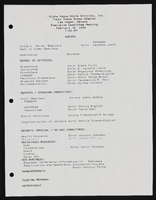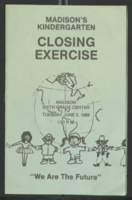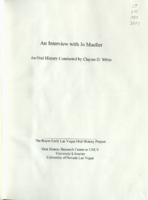Search the Special Collections and Archives Portal
Search Results

Alpha Kappa Alpha Sorority, Theta Theta Omega Chapter executive committee meeting agendas
Date
Archival Collection
Description
From the Alpha Kappa Alpha Sorority, Incorporated, Theta Theta Omega Chapter Records (MS-01014) -- Chapter records file.
Text

Casiano Corpus Jr. oral history interview: transcript
Date
Archival Collection
Description
Oral history interview with Casiano Corpus Jr. conducted by Cecilia Winchell and Stefani Evans on February 14, 2023 for the Reflections: the Las Vegas Asian American and Pacific Islander Oral History Project. In this interview, Corpus Jr. details a difficult childhood in the Philippines, where society is highly socioeconomically stratified. He recalls his parents working a number of jobs to support their large family, and as soon as he finished his primary schooling, he also started working in construction. When his father was finally petitioned by his uncle to move to the United States, Corpus was at first reluctant to go, since he had a familiar life in the Philippines, but has come to love the United States and the life he created for himself. Immediately after moving to the United States, their family landed in Las Vegas, Nevada, and Corpus began working a number of jobs. He started out as a busboy at a Chinese restaurant before deciding that he wanted to work in a casino and moved to Union Plaza. His current job is as a porter at Palace Station, where he has been for the past 31 years. He has also been working to unionize Palace Station and Station casinos with the Culinary Union for the past twelve years. He talks about the hunger strike he organized, why he organizes with no fear, and what he hopes to see out of his efforts throughout the interview.
Text

Mabel Hoggard: community interest materials (folder 2 of 3)
Date
Archival Collection
Description
Folder of materials from the Mabel Hoggard Papers (MS-00565) -- Personal papers file. This folder contains event programs, "Going For The Gold: The Story of Black Women in Sports" booklet by Ken Bently (a gift to J. David & Mabel W. Hoggard, not digitized in its entirety), "Pictorial Souvenir Book of the Pennsylvania State Federation of Women's Clubs, Inc." (not digitized in its entirety), and Alpha Kappa Alpha Sorority Theta Theta Omega Chapter 1988 "BLAC-tivities" calendar.
Mixed Content

Photographs of Treasure Island signs, Las Vegas (Nev.), 2002
Date
Archival Collection
Description
Site name: Treasure Island Hotel and Casino (Las Vegas, Nev.)
Site address: 3300 S Las Vegas Blvd
Sign owner: MGM Mirage
Sign details: Next to the Mirage, this property complements its sister property
Sign condition: Structure 5 Surface 5 Lighting 5 Signage is in good condition
Sign form: Pylon; Fascia; Porte-cochère
Sign-specific description: The Treasure Island Hotel and Casino sits between the Mirage and Spring Mountain road. Fitting right into the themed hotel resort genre that dominates this side of the strip, the Treasure Island provides one of the more unique facades. Just past the bust of Siegfried and Roy, the dense foliage and trees continue on almost fluently between properties. The first elements you see headed north is the giant sculpted pylon for the resort, set beside a sweeping incline drive, leading to the porte-cohere. The pylon is a collection a heavily crafted and sculpted elements, creating a framework for two message cabinets and a marquee banner on either side. At the base, steel poles exit the ground in a "V" shape, into the interior of the area designated for the LCD and backlit cabinets. Steel poles forma grid work between the "V" shape. The message boards are bordered by steel piles made to appear as if they are pieces of bamboo lashed together at the corners, extending past the joints in an irregular fashion. Two base poles and inner grid are finished in the same fashion. Above the message cabinet a three-dimensional sculpted crows nest sits just below a giant skull adorned with a scarf. The tip of the bottom of green finished crows nest just reaches the top of the two cabinets. The fully three dimensional skull is finished in a realistic fashion. Two giant swords cross each other in an X pattern behind the crow's nest and underneath the skull. The resultant effect is the pirate emblem of the "skull and cross bones" or "jolly roger." The hilts of the two swords come to rest on top of the message centers also. A grid work of false bamboo poles can be seen , providing a buffer between the two halves of the sign. Above the head of the pirate an arched steel cabinet ,creates a banner, which reads "Treasure Island" in white channel letters and filled with incandescent bulbs. Decorative scrollwork adorns the top of the banner as well as the two sides of the skull. The Treasure Island tower is also in the popular Y shaped configuration. The 38 story building stands 456 feet tall, with the text hung on the top of the tower in a couple of different fashions. On the face created by the north and southeast wings of the tower, Treasure Island is spelled in giant channel letters, but the two words are in close proximity to each other, resting in the angle created by the joining of the two wings into the center structure. The southwest face created by the west and southeast wings have the text separated. Treasure on the west towers and island on the southeast tower. The northwest side is appropriately displayed only on the north face of the wing, so the southbound traffic on I-15 can read the letters clearly. The Treasure Island also has two additional signs located toward the back of the property. Those would include a small pylon facing east west actually situated in the rear of the property. The pylon is a simple square supported with two square posts. The other resides on Spring Mtn Rd. headed east on the south side of the street. It resides on the corner of the main traffic flow from the parking garage and inner sanctum of roads leading to the porte- cochere.
Sign - type of display: Neon; Incandescent; Backlit
Sign - media: Steel; Plastic
Sign - non-neon treatments: Graphics; Paint
Sign animation: Oscillating
Notes: The only animation present is in the channel letters themselves. The incandescent bulbs on the interiors oscillate wildly
Sign environment: The front spectacular of the pirate show truly creates the theme of the pirate island, and is where most of the pedestrian traffic for the hotel is present. The pylon is just south of the spectacular, towering high overhead. The Treasure Island's environment is abruptly halted by Spring Mtn road but at the same time, it also wraps the corner of the hotel, and continues west. It is the bookend piece to the other major MGM resorts, which reside south of the Treasure Island. Even though it is a smaller child of the bigger properties, it still looms as a giant to its neighbors the Vagabond and Tam O'Shanter
Sign manufacturer: Atlandia Design
Sign - date of installation: 1993
Sign - thematic influences: The theme of the Treasure Island is painfully apparent, from its name to its live pirate show. The signage truly reflects it as well. Treasure Island is definitely in the class of properties, which can be called a themed resort. The main pylon looks to be constructed out pieces of a wrecked ship, with the most commonly seen symbol for a pirate, in the Jolly Roger skull, being the most impactful piece up there. Steel beams are finished to look like wooden masts, and giant ropes, slinging the entire sign together. It utilizes the three dimensional aspects, yet retains the design of a pylon. Unlike its neighbor to the south the mirage, the Treasure islands theme encompasses the main pylon, with the exception of the pylon in the rear of the property. The surroundings, which provide the background for the pylon, as well as the environment for the property, reflect them as well. The landscaping boasts tropical plants emitting false bird noises, which stretch around to the face of the property, where the pirate village and ships reside in cold waters, and faux cliffs. The wooden planks resembling pier docks, provide a tidy border for the arena and spectators. The theme has been seen before in one sense or related from a slight distance. None has actually utilized the name of the novel, and been so garish with the pirate theme, but it can be tied to propertied that are more island, and paradise themed. Such properties include the Mirage, the Tropicana, and the Castaways.
Surveyor: Joshua Cannaday
Survey - date completed: 2002
Sign keywords: Oscillating; Pylon; Fascia; Porte-cochère; Neon; Incandescent; Backlit; Steel; Plastic; Paint; Graphics
Mixed Content

Mike Meade interview, February 28, 1977: transcript
Date
Archival Collection
Description
On February 28, 1977, collector Steve Gortz interviewed Mike Meade (b. September 16, 1950 in San Francisco, California) about his life in Nevada. Meade speaks about growing up in Tonopah, Nevada before its decline in population, his move to Elko, Nevada and eventually to the city of Las Vegas. Moreover, he talks about the development of the Strip, the differences between Las Vegas and rural Nevada, as well as the changing environmental landscape. Meade also spends time discussing the controversy surrounding the University of Nevada, Las Vegas (UNLV) dormitory at the time of this interview, the attitude of locals, and his opinion on brothels and prostitution. Lastly, Meade talks about the city’s pollution, the sports and recreation throughout the whole of the state and ends by reading a poem about Nevada from a Bicentennial book.
Text

Mario Sandoval interview, December 6, 2018: transcript
Date
Archival Collection
Description
Interviewed by Claytee White. Mario and his six siblings were reared by a single mother who taught him all of the family recipes. Moving to Las Vegas at four years of age Mario remembers moving into a black neighborhood where the family was not welcomed. All windows in their home were broken into the first night. The family moved the next day. Though the new house was still in an African American neighborhood, they were protected by Vera, their black babysitter. Mario developed the intense work ethic of his mother, and after working in several strip casinos, found his home at the Horseshoe, today's Binion's. He has been there for 33 years; first as a busboy and then becoming a waiter. He is a Culinary Union trained shop student who picketed his beloved work place for ten months during a 1980's labor dispute. His work in life and union benefits have made his a very good life.
Text

Transcript of interview with Jo Mueller by Claytee White, August 26, 2011
Date
Archival Collection
Description
Jo Ann and Hal Mueller arrived in Las Vegas in 1956 when he accepted a meteorologist position. In addition to raising their two children, Jo was active in PTA, worked for Weight Watchers, and was a volunteer with League of Women voters. She tells the story of meeting Hal and their whirlwind romance to the altar, moving to the Caroline Islands and eventually choosing Las Vegas over Seattle as their next career assignment. Las Vegas became their permanent home and Jo reflects on life and experiences here.
Text

Transcript of interview with Sara Denton by Claytee White, July 13, 2015
Date
Archival Collection
Description
Sara Denton loves life, laughter, and wonderful adventures. She is the mother of four children, a Distinguished Nevadan, lover of books and art, political campaign organizer, community activist, and friend. Sara is one of the founders of Boulder City’s most successful philanthropic fundraisers, Art in the Park. Denton was born in Paducah, Kentucky, into a family of readers and thinkers. Therefore, when the opportunity arose, at 18 years of age, to move the Washington, DC to work in the Signal Corps, she seized the opportunity. From the vantage point of her apartment, she could see the Secret Service assisting Franklin D. Roosevelt into his limousine at the back door of the White House. His polio was hidden from the public but this diversion allowed Sara and her friends to greet and be greeted by their hero. While in DC, Sara worked for General Hayes and one day struck up a conversation with a young soldier, Ralph Denton. Soon they married and moved to his home state, Nevada. After several years in Elko, NV, the Dentons moved to Las Vegas where Sara worked in the campaigns of Grant Sawyer, Howard Cannon, and Alan Bible. Moving the family to Boulder City though, was the wisest relocation by the family because the children grew up in a caring community with good schools. And the city provided the opportunity for Sara’s creativity to flow in many directions including travel, entrepreneurship, philanthropy, and community building efforts. This interview is filled with laughter. I enjoyed the conversation.
Text

Transcript of interview with Judy Laliberte by LaVaun Hendrix, February 27, 1979
Date
Archival Collection
Description
On February 27, 1979, collector Judy Laliberte interviewed local school teacher LaVaun Hendrix in her home in Las Vegas, Nevada. The two discuss how Hendrix originally came to Nevada, her occupational history, and differences between the school system in Las Vegas and other states that she’s lived in. Hendrix explains how a changing school system has affected her job as a teacher and her students. She goes on to talk about the above-ground atomic tests, Helldorado, changes to the desert, and Nevada during World War II. The interview concludes with Hendrix describing her travels through Nevada.
Text

